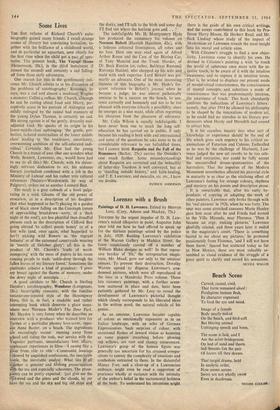Some Lives
THE first volume of Richard Church's auto- biography gained many friends. I recall strange scenes of illusory but convincing levitation, to- gether with the brilliance of a childhood world, and in particular an aquarium, seen clearly for the first time when the child got a pair pf spec- tacles. The present book, The Voyage Home (Heinemann, 30s.), is the third instalment (I Missed the second) and certainly a sad falling- off from those early adventures.
One reason for this is the gentlemanly reti- cence Mr. Church admits to in his discussion of he problems of autobiography : Rousseau, he says, was a cad and almost a madman; Wagner a monster; Cellini a ruffian. Mr. Church, although he can be cutting about Joad and Murry, per- ceptively acute in his portrait of Aldington and mildly outraged by the casual bad manners of the young Dylan Thomas, is certainly no cad. His strong egoism is of the gently, dreamily mal- adjusted kind. He speaks of its origin in his lower-middle-class upbringing: 'the gentle, pro- tective, isolated rnaternalism of the lower middle class' leading to 'the touchiness, uncertainty, overweening ambition of the self-educated indi- vidual.' Certainly Mr. Eliot had the young Church in a trance of awe. (But one wonders what Wells, Bennett, Lawrence, etc., would have had to say to all this.) 'Mr. Church, with his shiver- ingly nervous dedication to art, his arduous literary journalism combined with a job in the Ministry of Labour and his rather trite cultural references (Nature=Wordsworth by way of Palgrave), strikes me as another Leonard Bast.
The result is a grey cobweb of a book palpi- tating in a void. Gleams of the old power of evocation, as in a description of his daughter (but what happened to her?) playing in a garden or of black snow falling on the Cenotaph (omen of approaching breakdown—sorry, of a 'dark night of the soul'), are less plentiful than dreadful phrases such as the description of Clifford Bax going abroad `to collect poetic honey' or of a first wife (and, once again, what happened to her?) picking wild flowers as 'the vagrant botanist' or of the autumnal countryside wearing its 'mantle of October glory'; all this is the product of Mr. Church's 'trade of word- mongering' with the mess of papers in his room causing people to wade 'ankle-deep through the fallen leaves of my literary forest.' Sometimes the platitudes achieve a kind of grandeur: 'I press my breast against the thorns of memory, under the dewy night of nostalgia. . .
A good antidote to Mr. Church is Sterling Hayden's autobiography, Wanderer (Longmans, 28s.). Incorrigibly romantic, with the familiar testosterone-injected style of the Hemingway Hero, this is, in fact, a readable and rather interesting book which deserves a place some- Where near Norman Mailer's The Deer Park. Mr. Hayden is very funny when he describes an
J1
mterview with a producer who wanted him for Tanen or a particular phoney love-scene, oppo- iite Anne Baxter, on a beach. The ingredients lie exceedingly varied : running away from school and riding the rods, war service with the crugoslav partisans, unsatisfactory love affairs, iinOleasant experiences in films-1 swung like a
.1-
goon from role to role'—Communist leanings followed by anguished confessions, the inevitable ',little, the inevitable analyst. What ties It all aiether is genuine and lifelong preoccupation Oith the sea and especially schooners. The prose- poetry can be pretty expected: 'just give me the FaCkweed and the pines and the clouds, let me have the sea and the sky and big old ships and the docks, and I'll talk to the birds and some day I'll find out where the horizon goes and. ..
The indefatigable Mr. H. Montgomery Hyde has produced the customary fat volume on Norman Birkett (Hamish Hamilton, 42s.), with a hideous coloured frontispiece, all robes and no face. Here one may read again of Alfred Arthur Rouse and the Case of the Blazing Car, of Tony Mancini and the Trunk Murder, of Dr. Buck Ruxton (or, rather, Bakhtyar Rustomji Ruttonju Hakim), who chopped up his wife and maid with such expertise. Lord Birkett was pri- marily an advocate. One of the most interesting features of this biography is Mr. Hyde's fre- quent reference to Birkett's journal when he became a judge; he was almost pathetically anxious to be a success on the bench, to sen- tence correctly and humanely and not to be too pleasant with everyone (clearly a possibility, since he emerges as a nice man), while often regretting his elevation from the pleasures of advocacy.
Mr. Colin Wilson is equally indefatigable. I have never been one to mock the long self- education he has carried on in public, if only because his reading is both wide and international and some of the questions he asks seem to be of considerable relevance to our befuddled times, but I cannot think Rasputin and the Fall of the Romanovs (Barker, 25s.) carries the Outsider's case much farther. Some misunderstandings about Rasputin are corrected and the imbecility of latter-day Tsardom is well conveyed, but as to 'standing outside history,' and faith-healing, and T. E. Lawrence, and mescalin, etc. etc., I have






























 Previous page
Previous page